Why Is Gambling Illegal In Most States
In most of the United States, the legal framework does not consider it illegal to bet cryptocurrencies in online casinos. However, we need to take a look at the most critical law in US online gambling to understand whether bitcoin gambling is legal in the country or not. If state-run lotteries are included, then 48 states allow some form of gambling (the exceptions are Hawaii, where gambling was outlawed prior to statehood, and Utah, which has a Mormon majority population and also bans gambling in the State Constitution). However, casino-style gambling is much less widespread.
Gambling on the internet has become an extremely popular pastime—even though it is illegal in many states.
Online sports betting, in particular, has increased on sites located in countries where gambling is legal—but is that also a violation of U.S. laws?
In an era when the internet is posing challenges across the entire legal landscape, the time is ripe for testing the validity of the various state gambling laws on their applicability to offshore internet gambling. Such tests would also place in the spotlight the activities of offshore gambling “bookies,” who give their customers the ability to place bets via the internet and collect payments or make payments to the bettors.
Some states have pursued criminal prosecutions against offshore bettors, but many of those prosecutions are based on laws that were enacted long before internet betting existed, in states such as New York. And even in those states where penal codes specifically reference internet betting, those statutes are vulnerable to constitutional argument regarding limiting the use of the web.
The statutes affect a sizeable number of Americans. In a New York Times article published on Dec. 5, columnist Adam Liptak writes, “Americans are estimated to annually place $150 billion in illegal wagers on sports”—an estimate that presumably includes betting activities both inside the U.S. and through offshore sites.

Addressing the legality of offshore gambling represents a challenge to authorities where it hits them hardest: their revenue streams.
Offshore gambling prosecution has become a source of income to state and federal governments. Based on their statutory ability to seize the proceeds of illegal activity, authorities have levied fines, and seized property and cash.
The two elements that trigger prosecution in many of the state gambling statutes are (1) bets must have been accepted by the defendant in the state; and/or (2) the bets must be made in the state.
The argument that a bet is not made in internet gambling until it is received at the offshore site needs to be decided by the various states.

Decisions upholding the theory that when the bet reaches and lands on the site in a foreign country, it is made there—and not in the state—would have far-reaching effects on gambling prosecutions. Such bets would not satisfy the argument that a bookie accepts and receives them.
Pursuant to Title 18 §981(a)(1)(c) of the U.S. penal code, which makes property forfeitable if derived as the proceeds of illegal activity, the government—by merely filing a complaint with the court—may get a warrant issued allowing the seizure of property.
Still, the law is underdeveloped, because plea deals are usually structured to maximize financial benefit for the prosecution and allow those arrested to avoid incarceration. Since gambling is prevalent throughout the U.S. in many legalized forms, and engaged in by a large portion of the population, prosecutors are not comfortable that juries will convict their fellow citizens for these crimes.
If the laws were contested, however, we would see fewer arrests and a stronger negotiating position for defendants against whom charges are brought.
The Federal Gambling Statute (Title 18 §1955) requires a finding of a violation of state gambling laws to bring charges against someone who was involved in such illegal activity. According to the statute, an illegal gambling business is defined as being “in violation of the law of a state or political subdivision….”
Efforts to contest the validity of state gambling laws are likely to result in a finding that many are inapplicable to offshore gambling.If there is no state law violation, then there is no federal prosecution.
In fact, efforts to contest the validity of state gambling laws are likely to result in a finding that many are inapplicable to offshore gambling. When those laws are invalidated, there can be no federal violation and no property seizures.
The laws of the 50 states concerning gambling are varied and contain significantly different provisions. Many like NY Penal Code §225.10, which defines promoting gambling in the first degree (the felony section), contain the material element that the defendant “receives or accepts … bets … .”
See also: Video Gambling Linked to Crime Spike: Study
Typically, a defendant is charged with being a bookie because he/she is the person arranging for the bettor to have the ability to use the offshore website to place bets. The bookie also collects and distributes funds to the bettor based on wins or losses. Before internet gambling, the bookie would receive the bets from the bettor.
The law in New York was written to make such activity illegal and required that the defendant “receives or accepts … bets …
Similarly, in Alabama, bookmaking is described as “unlawfully accepting bets from members of the public as a business …” This echoes New York’s requirement that bets must be accepted to violate the law.
However, under Alaska’s penal code §11.66.200(a) “a person commits the crime of promoting gambling in the first degree if the person promotes or profits from the unlawful gambling enterprise.”
Here, there is no requirement of accepting bets to violate the statute. Additionally, Indiana’s penal code §35-45-5.3 declares that gambling is committed if one “… accepts or offers to accept, for profit money or property risked in gambling …”
The mere acceptance of money or property without the requirement of accepting bets violates the Alabama statute. With internet gambling, the defendant never receives nor accepts bets. The bets are sent by computer to a site in a country where gambling is legal and where the bets are received and accepted.
This material element of the New York statute is not violated by internet gambling.
This issue was never tested in New York, although hundreds of offshore gambling cases have been brought under this statute. In a September, 2017 case in the Supreme Court of Queens County (New York), I made a motion to dismiss an indictment under this theory.
While the Court denied the motion, the defendant was offered a far better plea resolution than the prosecution might have presented if there were no risk to the prosecutors of a reversal on appeal.
There are states whose gambling statutes make it illegal to use the internet to promote gambling. An example is the above-mentioned Indiana Statute, which states that a person commits professional unlawful gambling when he or she is “an operator who knowingly or intentionally uses the internet to engage in unlawful gambling in Indiana.”

This is a felony.

While most states have not reached this level of sophistication, the challenges passed by such laws differ from those discussed above. However, because of the various constitutional issues involved in criminalizing the use of the Internet, there are often safe havens that exist in the statute.
Indiana’s law states that “a prosecuting attorney may send written notice to an operator … The notice must (1) specify the illegal gambling activity; (2) state that the operator has not more than thirty (30) days…to remove the illegal gambling activity and…” if he does not do so he can be criminally prosecuted.
This section specifically refers to an operator who is defined as “a person who owns, maintains or operates an internet site that is used for interactive gambling.”
Thus, compliance with notice would seem to avoid criminal prosecution.
Again, since internet offshore gambling did not exist when many of these laws were written, they cannot be held to be applicable.

It’s time to litigate the underlying premises of the various state illegal gambling statutes, particularly those that require the acceptance of bets.
Jeffrey C. Hoffman is a white-collar defense and corporate investigation lawyer at Windels Marx Lane & Mittendorf, LLP, a full-service law firm headquartered in New York City. In his 40-plus years as a lawyer, he has tried more than 100 criminal jury trials and has represented clients in matters involving money laundering, criminal forfeiture of property and restitution. He can be reached at jhoffman@windelsmarx.com. He welcomes readers’ comments.
If you’re an experienced gambler, you know how difficult it is to find a reliable online casino that serves US citizens. The same holds true for both sites that use traditional currencies, as well as those that use bitcoin. In most of the United States, the legal framework does not consider it illegal to bet cryptocurrencies in online casinos. However, we need to take a look at the most critical law in US online gambling to understand whether bitcoin gambling is legal in the country or not.
The law we’re talking about is called the Unlawful Internet Gambling Enforcement Act (UIGEA), and it was signed in October 2006. This Act stipulates that credit card companies and banking facilities do not have the authority to execute transactions related to online gambling. In simpler terms, online casinos had been able to use the US banking system for their purposes until 2006, but UIGEA has made that illegal.
Some of the biggest global operators were forced to withdraw from the US market. However, since the Act only mentions the traditional banking system and doesn’t say anything about cryptocurrency, some online casino operators decided to switch their focus to this payment option. This loophole enabled the casinos to technically remain within the boundaries of the law.
The Confusing Laws Regarding Online Gambling
Consequently, there is no federal legislation that makes online gambling illegal. Current laws explicitly prohibit casinos from accepting bets on US soil, but no laws exist about placing bets from the territory of the United States. This is precisely why all bitcoin casinos are based outside of the country, which allows them to accept bets while circumventing US regulations. In terms of practicality, Bitcoin’s legal status dramatically depends on each specific state. There are three possible options: illegal, legal, and not unlawful.
Residents of Nevada, New Jersey, and Delaware are allowed to use Bitcoin in any gambling activities. Special geo-targeting software must be used by the casinos to ensure that the customers are indeed physically located in one of the three states. This software is easily circumvented by VPNs, which a lot of gamblers in the States use to hide their IP address.
Laws in the Individual States
Washington is the only US state that expressly prohibits online gambling. Offshore gambling sites may not be used by state residents, meaning that they are not allowed to register there nor place bets regardless of the currency they intend to use. Online casinos are required to turn away players with IP addresses coming from the Evergreen State. However, since the state doesn’t have the necessary human resources to keep track of every potential player, Washingtonians still gamble thanks to VPNs.
Unlike Washington, the majority of US states neither forbid nor explicitly allow online gambling activities for their citizens. Players, therefore, must abide by federal laws, particularly UIGEA, which we mentioned earlier. That said, there have been no charges against players since the Act came into effect.
Why Is Gambling A Sin
This legislation primarily targets online exchanges and banks that process payments related to online gambling. However, it is always a good idea to remain vigilant and use a VPN if you plan to gamble online. Also, as should be the case with any online activity you take part in, leave as little personal information as possible.
Why Is Gambling Illegal In Most States In The United States
Gambling on Bitcoin games is not deemed unlawful in the majority of states. However, some states still consider this topic controversial, and disputes over it arise daily. It is uncertain whether this discussion will lead to further liberalization or prohibition. Keep this in mind when considering Bitcoin gambling, since this advice may not stay relevant in the future. Before registering in any online casino, make sure that gambling is still legal in your area.